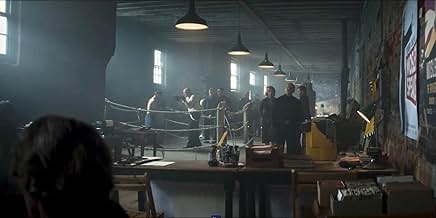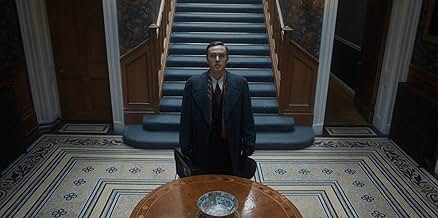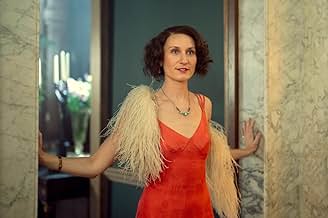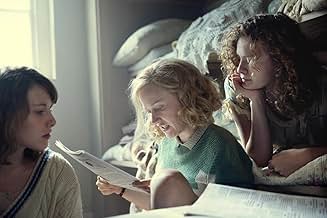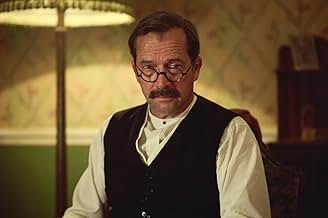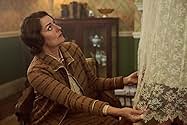Basé sur l'histoire des sœurs Mitford, six sœurs qui refusaient de se plier aux règles et dont les vies souvent scandaleuses ont fait la une des journaux du monde entier.Basé sur l'histoire des sœurs Mitford, six sœurs qui refusaient de se plier aux règles et dont les vies souvent scandaleuses ont fait la une des journaux du monde entier.Basé sur l'histoire des sœurs Mitford, six sœurs qui refusaient de se plier aux règles et dont les vies souvent scandaleuses ont fait la une des journaux du monde entier.
Parcourir les épisodes
Avis à la une
The Mitfords are one of, if not THE, most interesting families of the 20th century, so l've been waiting for this biopic for some time, even though much has been used in Nancy's biographic novels 'The Pursuit of Love' and 'Love in a Cold Climate', both of which have been adapted for television several times. Their story is seen through the eyes of the eldest Mitford, Nancy, the author and although the sisters bear no physical resemblance to the reality (that would be hoping for too much) the characters are fairly well defined, if a little bland in some cases. My grandfather met Nancy when a Bright Young Thing and took her to a party. I don't know what he would have made of this. What is missing is the distinctive Mitford drawl, which you can hear in interviews, obviously toned down for modern 'Estuary English' audiences. What redeems this series however is the love the sisters have for each other, even though often diametrically opposed to each other.
Let me get one thing out of the way first. They can never get the hairstyles right in these period pieces. I read once that art evaluators always look at the hair first when trying to see if a painting is fake; counterfeiters just can't get it right. Nor can modern hairstylists. The sisters' hair was completely anomalous.
And now, why was it sanitised? Nancy, who narrated the series was cast as a wise elder sister on good terms with all of her siblings to begin with. In fact she bullied them terribly, even into adulthood with a waspish wit and sarcasm.
Tom was a fascist but portrayed as a good egg in the series; he even refused to fight against Germany.
Muv was a fascist in real life. So deep were her leanings that she separated from Farve because of his patriotism for the UK. Yet in the series she's portrayed as a gentle, mother goddess with no political views, indeed, if anything, shocked at the doings of her two fascist and Nazi daughters.
Pam was a virulent anti-Semite who stated, along with her husband, on many occasions that all Jews should be killed. Yet she's portrayed as a jolly hockey sticks hoyden and a sympathetic character.
Unity was a Nazi and that was made clear in the show. But for goodness sake! They brought modern psychology into it. The actress playing her had clearly been directed to play her as neurodivergent.
Jessica and Diana seemed to be the only ones who were, more or less, true to life.
Someone of my age and generation would know about this family from parents, newspapers, Nancy's novels and Jessica's work. They were a pretty gruesome bunch. Perhaps historical accuracy would have made the series far too depressing.
As it was, I watched the lot in 24 hours. I enjoyed it but I felt disappointed and had a sense that an opportunity was missed. I am nonetheless looking forward to the second season.
A bit of a mixed review, I'm afraid. I'd say watch it but with no great expectations.
And now, why was it sanitised? Nancy, who narrated the series was cast as a wise elder sister on good terms with all of her siblings to begin with. In fact she bullied them terribly, even into adulthood with a waspish wit and sarcasm.
Tom was a fascist but portrayed as a good egg in the series; he even refused to fight against Germany.
Muv was a fascist in real life. So deep were her leanings that she separated from Farve because of his patriotism for the UK. Yet in the series she's portrayed as a gentle, mother goddess with no political views, indeed, if anything, shocked at the doings of her two fascist and Nazi daughters.
Pam was a virulent anti-Semite who stated, along with her husband, on many occasions that all Jews should be killed. Yet she's portrayed as a jolly hockey sticks hoyden and a sympathetic character.
Unity was a Nazi and that was made clear in the show. But for goodness sake! They brought modern psychology into it. The actress playing her had clearly been directed to play her as neurodivergent.
Jessica and Diana seemed to be the only ones who were, more or less, true to life.
Someone of my age and generation would know about this family from parents, newspapers, Nancy's novels and Jessica's work. They were a pretty gruesome bunch. Perhaps historical accuracy would have made the series far too depressing.
As it was, I watched the lot in 24 hours. I enjoyed it but I felt disappointed and had a sense that an opportunity was missed. I am nonetheless looking forward to the second season.
A bit of a mixed review, I'm afraid. I'd say watch it but with no great expectations.
It's easy to dismiss the Mitfords as posh, privileged and irrelevant, but that would be a mistake. The main theme of the first series, which only goes up to 1937, is the issue of how people can easily get swept up into extremist movements, which is just as relevant today as it was in the 1930s.
As others say, truth is stranger than fiction. If this had been presented as fictional, you'd say it was implausible, but almost everything described in the series really happened (though at least one of the characters is an invention). And what happens next, which we will probably see in the inevitable series 2, is even more shocking. It's remarkable that anyone could describe this story as boring. I suppose there are no car chases or shoot-outs.
The production is good (houses, cars, dresses...) although some of the scenes supposedly set in Germany are not very convincing. The acting performances are strong, considering how difficult these roles are to play. Kudos to the brave girls who took on the challenging roles of Diana and Unity.
As others say, truth is stranger than fiction. If this had been presented as fictional, you'd say it was implausible, but almost everything described in the series really happened (though at least one of the characters is an invention). And what happens next, which we will probably see in the inevitable series 2, is even more shocking. It's remarkable that anyone could describe this story as boring. I suppose there are no car chases or shoot-outs.
The production is good (houses, cars, dresses...) although some of the scenes supposedly set in Germany are not very convincing. The acting performances are strong, considering how difficult these roles are to play. Kudos to the brave girls who took on the challenging roles of Diana and Unity.
This drama portrays life in the 1930s of the extraordinary Mitford family.
In fact it could have been called Extraordinary rather than Outrageous.
The protagonist is Nancy Mitford who became an established author.
The telling of their lives underlines just how autobiographical Nancy's most famous publications really are, The Pursuit of Love and Love in a Cold Climate.
Their pursuit of love wasn't really love at all, it was the pursuit of an eligible men with an income that would keep the Mitford sisters in the style of life to which they were accustomed.
As such, in the 1930s, they had very little to offer and their whole existence seemed to be aimed at "coming out" or presented to society at the annual debutants ball.
Very shallow indeed, but these were not ordinary women they held very strong views not always in alignment with one another, so much so that Unity and Diana finding themselves embroiled in Fascism.
Anyway, it is a good drama and is enhanced with a mainly unfamiliar cast. Only Anna Chancellor, as the mother, being instantly recognizable.
In fact it could have been called Extraordinary rather than Outrageous.
The protagonist is Nancy Mitford who became an established author.
The telling of their lives underlines just how autobiographical Nancy's most famous publications really are, The Pursuit of Love and Love in a Cold Climate.
Their pursuit of love wasn't really love at all, it was the pursuit of an eligible men with an income that would keep the Mitford sisters in the style of life to which they were accustomed.
As such, in the 1930s, they had very little to offer and their whole existence seemed to be aimed at "coming out" or presented to society at the annual debutants ball.
Very shallow indeed, but these were not ordinary women they held very strong views not always in alignment with one another, so much so that Unity and Diana finding themselves embroiled in Fascism.
Anyway, it is a good drama and is enhanced with a mainly unfamiliar cast. Only Anna Chancellor, as the mother, being instantly recognizable.
I must say, my teeth were grinding even before I started to watch... reading that the Milford girls were 'independent minded rule breakers who threw off convention'. They weren't. They came from a background so privileged and entitled that the 'rules' others lived by were not even recognized by them. They didn't break rules knowingly, they were unaware of them.
The pre show blurb went on to speak of their lack of education, when in fact they were educated at home like so many women in history. A university education was never the only form of education. Their letters alone will tell any reader as much about what they did know as what they didn't.
The first episode, seemed to be the cliched cartoonish version of the English upper classes between the wars which holds sway with the chattering classes now.
But it did improve, its talented cast brought out some of the layers in their bilateral relationships, and the increasing clouds on the political horizons began to make their presence felt amidst the unfathomable stupidity of at least three of these under-employed but seemingly intelligent women.
What remains unpalatable (the commitment to fascism before, during and after the war of at least two of these daughters, and the similarly odd communist sympathies of another) is almost impossible to understand, other than to reflect on how divorced from the reality of most people they really were; by class, by design and by history.
Their characters are individually interesting when one reads their diaries, letters, work etc...but perhaps the story of these siblings cannot be told collectively without making it seem glib and crass, given its relationship to the sweep of history in the 20c.
The pre show blurb went on to speak of their lack of education, when in fact they were educated at home like so many women in history. A university education was never the only form of education. Their letters alone will tell any reader as much about what they did know as what they didn't.
The first episode, seemed to be the cliched cartoonish version of the English upper classes between the wars which holds sway with the chattering classes now.
But it did improve, its talented cast brought out some of the layers in their bilateral relationships, and the increasing clouds on the political horizons began to make their presence felt amidst the unfathomable stupidity of at least three of these under-employed but seemingly intelligent women.
What remains unpalatable (the commitment to fascism before, during and after the war of at least two of these daughters, and the similarly odd communist sympathies of another) is almost impossible to understand, other than to reflect on how divorced from the reality of most people they really were; by class, by design and by history.
Their characters are individually interesting when one reads their diaries, letters, work etc...but perhaps the story of these siblings cannot be told collectively without making it seem glib and crass, given its relationship to the sweep of history in the 20c.
Le saviez-vous
- AnecdotesThe opening scene takes place in September 1931 and the closing scene of season one takes place in January 1937. Nancy ages from 26 to 32 years old; Pam was 23-29, Tom was 22-28, Diana was 21-26, Unity was 17-22, Jessica was 14-19, and youngest sister Deborah was 11 to 16 years old during this time period.
Meilleurs choix
Connectez-vous pour évaluer et suivre la liste de favoris afin de recevoir des recommandations personnalisées
- How many seasons does Outrageous have?Alimenté par Alexa
Détails
- Date de sortie
- Pays d’origine
- Langue
- Aussi connu sous le nom de
- Skandalsystrarna Mitford
- Sociétés de production
- Voir plus de crédits d'entreprise sur IMDbPro
Contribuer à cette page
Suggérer une modification ou ajouter du contenu manquant




